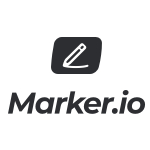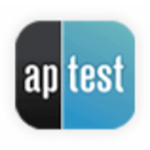List of Best Bug Tracking Software
Showing 10 of 16 productsMonday.com is more than just a project management tool - its a dynamic platform that enhances productivity and collaboration within teams. With its user-friendly interface and customizable features, Monday.com streamlines processes and empowers indiv...Read Monday com Reviews
Marker.io is a tool that streamlines the process of capturing and reporting visual feedback on websites. By eliminating the need for endless emails and confusing screenshots, it allows teams to communicate clearly is a ly, saving valuable time and en...Read Marker.io Reviews
Kualitee, the ultimate tool for software testing and quality assurance. With its user-friendly interface features, Kualitee simplifies the testing process and helps teams deliver high-quality software products. Say goodbye to complex testing methods...Read Kualitee Reviews
ApTest is a tool for all of your software testing needs. With its user-friendly interface features, ApTest simplifies the testing process and ensures the highest level of accuracy. Say goodbye to tedious and error-prone testing methods and hello to e...Read ApTest Reviews
Zipy is a dynamic and versatile software designed to simplify your digital life. With its intuitive interface and powerful features, Zipy makes managing your files, documents, and tasks effortless is a . Say goodbye to cluttered folders and hello to...Read Zipy Reviews
Unfuddle is a project management software designed to streamline team collaboration and increase productivity. With its user-friendly interface and robust features, Unfuddle allows teams to effortlessly manage tasks, track progress, and communicate e...Read Unfuddle Reviews
Bugasura is a solution for all your bug tracking and project management needs. With its user-friendly interface features, Bugasura streamlines the entire bug reporting process, ensuring efficient communication and seamless collaboration amongst team...Read Bugasura Reviews
Shortcut is a solution for streamlining your tasks and increasing productivity. With its user-friendly interface and powerful features, Shortcut is here to revolutionize the way you work. Say goodbye to lengthy processes and hello to efficiency with...Read Shortcut Reviews
Xebrio is a software solution designed to streamline your business operations and boost productivity. With its user-friendly interface features, Xebrio is a tool for managing tasks, communication, and collaboration within your organization. Join coun...Read Xebrio Reviews
OpenProject is a and user-friendly project management software that streamlines collaboration and boosts productivity. It offers a range of tools and features to effectively manage projects, tasks, and team members. With its intuitive interface and r...Read OpenProject Reviews
- What Is Bug Tracking Software?
- Top Reasons Why Businesses Need Bug Tracking Software?
- What Are the Top Key Features of Bug Tracking Software?
- What Are the Top Benefits of Bug Tracking Software?
- What Are the Steps to Choose the Right Bug Tracking Software?
- What Are the Types of Bug Tracking Software for Different Industries?
- What Are the Technology Trends for Best Bug Tracking Software?
- What Are the Deployment Options for Bug Tracking Software?
What Is Bug Tracking Software?
Bug tracking software is a type of software that is used to track, monitor, and report defects in software development projects. It was created expressly to assist software teams in locating and managing software problems, making it an essential tool for software engineering teams. This type of software facilitates and expedites collaboration among team members.
Bug-tracking software, automated notifications, a reporting system, and progress tracking are all common elements of bug-tracking tools. This makes it easier to manage and fix defects promptly, reduces debugging time, and improves communication among team members.
Software for bug tracking tools also saves all relevant information, such as the date the defect was identified, a synopsis of the problem, and instructions on how to repair the problem. This enables the team to be aware of any issues that may have contributed to the bug's occurrence, as well as appropriately document and handle each bug until it is resolved.
In conclusion, the best bug-tracking tools are critical in any software development project, assisting teams in shortening development time and producing more efficient products. It facilitates team collaboration and decreases the amount of time spent debugging problems.
Top Reasons Why Businesses Need Bug Tracking Software?
1. Maintains a record of all software bugs for quick resolution.
2. Enables numerous developers to work together to resolve bugs.
3. Aids in the prioritization of bugs for timely resolution.
4. It serves as a central store for software issue reporting and resolutions.
5. Prevents unauthorized access to confidential information.
6. Facilitates quick and easy communication among development teams.
7. Allows for the tracking of all software versions, allowing faults to be recreated and remedied rapidly.
8. Increases transparency into the bug resolution process.
9. Improves accountability and prioritizes bug management.
10. Allows software developers and users to communicate in a clear and documented manner.
11. Aids in the detection and containment of software faults that may cause downtime and performance difficulties.
12. Increases the quality of software and customer satisfaction.
13. Informs stakeholders about the status of bug resolution and when fixes are expected.
14. Assists in ensuring compliance with legal obligations about software security.
15. Facilitates the tracking and monitoring of specific software bugs.
What Are the Top Key Features of Bug Tracking Software?
The top key features of bug-tracking software include:
1. Automated Workflows: Teams can use automated workflows to automate their best bug tracking tools, from issue creation to resolution. These routines are intended to reduce time and increase productivity.
2. Issue Tracking: A bug-tracking tool should make it easy for users to keep track of issues. This involves categorizing them, adding tags, assigning specific personnel to work on them, and defining priorities.
3. customizable dashboards: Dashboards should be customizable so that teams may examine relevant data and KPIs for their project.
4. Communication: Bug tracking systems should facilitate communication among developers and other stakeholders. This could include a chat system, email notifications, or a messaging system that is incorporated.
5. Prioritisation: A bug tracking system allows developers to prioritize which issues to address first. This allows teams to focus their energy and resources on the most pressing challenges first.
6. Analytics: Having complete visibility over the progress of a project is critical to any software for bug tracking. Analytics should be offered to act as a reliable source of information on the project's development.
7. Security: Because software for bug tracking is secret, security should always be a top focus. Organizations should make investments to ensure that bug-tracking system security protocols are up to date.
What Are the Top Benefits of Bug Tracking Software?
1. Increased visibility: A bug tracking system allows you to track the status of bugs and their progress from identification to resolution in real-time. This raises bug visibility across many teams and can lead to greater communication and collaboration among stakeholders.
2. Improved efficiency and quality: A bug tracking tool allows teams to prioritize, assign, and monitor bugs in an organized manner. This ensures that issues are addressed efficiently, resulting in higher end-product quality.
3. Reproducibility: The best bug-tracking tools make it easy to swiftly recreate and debug errors. This reduces the amount of time and effort required to fix the bug.
4. Accountability: Software for top bug-tracking tools ensures that all developers are held accountable for their actions. It also fosters a quality assurance culture within the development team.
5. Prioritization: Bug tracking systems enable teams to prioritize problems based on their severity and importance. This guarantees that the most critical defects are handled first, which can lead to higher levels of customer satisfaction.
6. Documentation: Bug tracking systems keep a full record of defects and how they were resolved, which can be beneficial for analyzing patterns and optimizing the development process.
What Are the Steps to Choose the Right Bug Tracking Software?
1. First, determine your organization's requirements. Consider what you want to do with the bug tracking software: thorough bug tracking, automated bug tracking, web-based bug tracking, and so on. This will help you determine what kind of the best bug-tracking tools you require.
2. Investigate the features and benefits of various software options. Read product reviews, compare product pricing, and look at customer testimonials to get a sense of the software's strengths and limitations.
3. Determine your software budget and look for software with features that are inside your budget.
4. Ensure that the bug-tracking software you select is compatible with your other existing tools. Your bug-tracking system should integrate effortlessly with the rest of your software programs.
5. Finally, before you commit, do a free trial of the product. This will give you a better understanding of whether the bug-tracking tools will fit your requirements.
What Are the Types of Bug Tracking Software for Different Industries?
There are numerous types of bug-tracking software available, each specialized to a certain industry. These systems, in general, enable users to document, prioritize, and monitor bugs and other issues across various software projects.
Businesses that develop software for commercial use frequently employ the best bug-tracking tools that include capabilities such as dashboards, task lists, automated alerts, and code integration. This software is typically suited to a certain development environment and serves as an excellent project management tool.
Performance software companies may utilize specialized bug monitoring software with features such as distributed bug tracking software, real-time response, and automatic bug recognition. This program is intended to be used in conjunction with performance and regression testing tools.
Manufacturing companies may employ bug-tracking software with features such as versioning, customization, and asset change tracking. This program is intended to track problems in a mass manufacturing setting. The bug-tracking tools designed to track patient care concerns and software changes may be used by healthcare organizations.
Features such as patient safety tracking, incident reporting, and workflow tracking may be included in this sort of software. Finally, educational institutions may employ bug-tracking software that is specifically built for teaching and learning management and includes features such as testing integration, collaboration capabilities, and student project monitoring.
All of these bug-tracking software systems are intended to meet the needs of various businesses while also providing the capabilities required to manage software development efficiently.
What Are the Technology Trends for Best Bug Tracking Software?
In recent years, bug-tracking software has grown in popularity among software development teams. The finest bug-tracking tools should have enough features to fulfill the needs of the team while also keeping up with the newest technological advancements.
Some of the most recent technological advances in bug-tracking systems are as follows:
1. Cloud-based software: Because users can use this type of software from anywhere, cloud-based software is becoming increasingly popular for bug tracking software. This enables teams to collaborate regardless of where they are located.
2. Artificial intelligence (AI): AI can assist teams in identifying and prioritizing bugs. AI can also assist developers with problem-solving strategies.
3. Automation: Automation is becoming increasingly vital for efficient bug tracking system since it may speed up procedures such as issue tracking, status report updates, and automatic alerting.
4. Mobile-friendly: Mobile-friendly best bug tracking tools are required to ensure that all team members have access to the data and may collaborate as necessary. Teams may guarantee that they are utilizing the finest top bug-tracking software for their needs by staying up to date on current trends.
What Are the Deployment Options for Bug Tracking Software?
The deployment choices for the best bug-tracking software differ depending on the software platform and the needs of the customer. Bug tracking software can often be deployed in the cloud or on-premises.
1. Cloud-based deployment strategies often offer lower upfront costs and faster implementation timelines, whilst on-premises solutions typically provide more control and customization choices.
2. Furthermore, certain bug-tracking systems can be self-hosted, allowing customers to deploy the software to their servers and take complete control over setup and maintenance.










